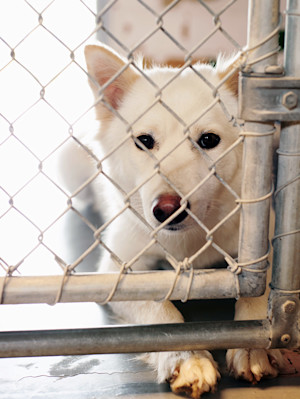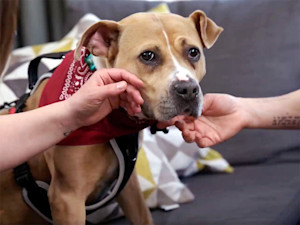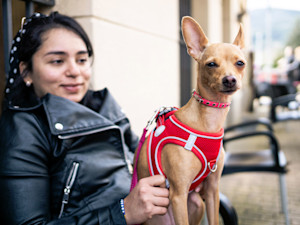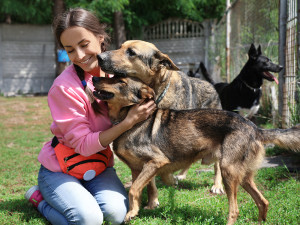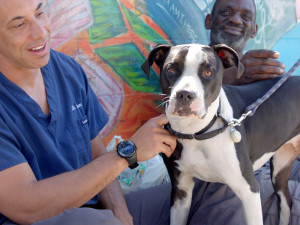What’s Goldie’s Act? And Why Animal Rights Activists Are Backing It
Named for a Golden Retriever who died a tragic, preventable death, this legislation would protect other animals from meeting the same fate.
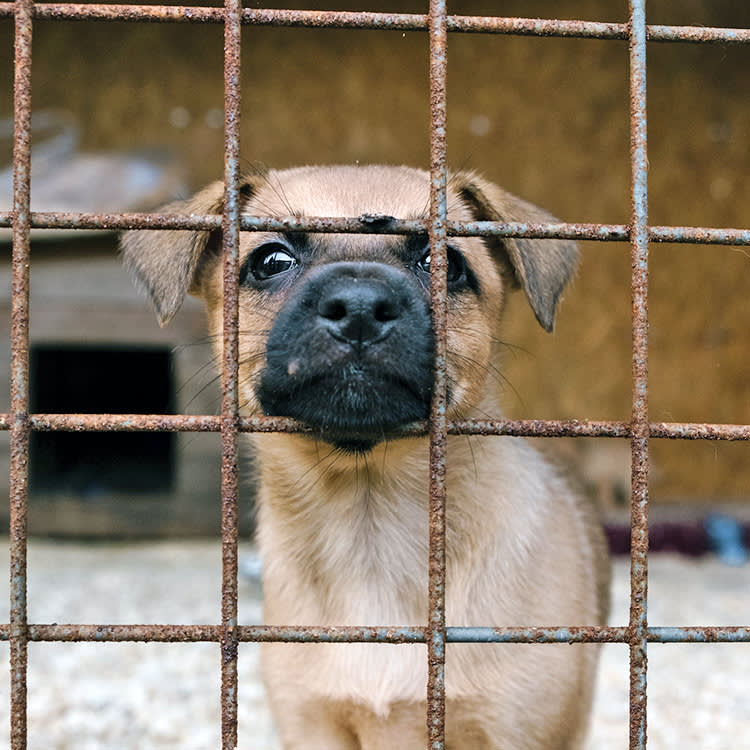
Share Article
In April 2021, when USDA investigators first met the famous Golden Retriever Goldie, she didn’t have a name. She was one of about 1,000 dogs housed in a USDA-licensed puppy mill, and so, she was just a number — number 142, to be exact.
Goldie was already emaciated back then, but because she was under veterinary treatment at the time, inspectors left her there. When they returned months later, they found her hidden in a filthy horse stall. Her skeleton jutted out in all directions, painfully visible even under a thick layer of fur. The photos from the United States’ eventual lawsuitopens in a new tab against the breeder are horrifying. Due to her condition, Goldie was later euthanized.

Get (totally free) deals for food, treats, accessories, tech, and way more pet parenting must-haves.
opens in a new tabBrynáe Riggins, senior manager of federal legislation with the ASPCA, still remembers examining video footage of Goldie obtained through a Freedom of Information Act (FOIA) request. “It was so, so, so hard to get through,” she tells us, especially considering that Goldie and the other animals around her “were actually living this every single day.”
Unfortunately, the circumstances that led to Goldie’s death are nothing new. As seen in audits from the USDA’s Office of Inspector General, this is a problem decades in the making.
“The longer we wait, the higher the chances are for other vulnerable animals to go through the same thing Goldie went through,” Riggins says — which is why she and the ASPCA are collaborating with lawmakers to pass Goldie’s Act. The bill is designed to strengthen USDA protections for animals in commercial facilities.
What would Goldie’s Act do?
Goldie’s Act is a bill that would require the USDA to report and penalize dog breeders who violate the Animal Welfare Act — which outlines animal care requirements for commercial facilities like puppy mills. The bill first landed in the House of Representatives in 2021 with bipartisan support and was re-introduced in 2023. This spring, Sens. Richard Blumenthal of Connecticut and Rick Scott of Florida introduced a version of the bill in the Senate.
The provisions within Goldie’s Act include the authority to remove animals who are in need of care from these facilities; to conduct frequent inspections on commercial breeding facilities to ensure adequate oversight; to issue penalties against violators to deter bad behavior; and to inform law enforcement of concerning violations so that they can take necessary investigative steps on their end.
“It’s not establishing any new protocols or any new standards,” Riggins says of the legislation. “It’s simply telling the agency to use the existing authority that it has.”
Why is Goldie’s Act important?
Although the USDA already has the authority to oversee commercial dog-breeding facilities, the agency’s own Office of Inspector General (OIG) has published multiple reports that call out lackluster enforcement practices. One of these reports, published in 2010opens in a new tab, found that the Animal and Plant Health Inspection Service (APHIS) had reduced penalties for violating facilities so drastically from the maximum that they’d become “basically meaningless.”
“I think it’s important for people to understand the gravity of the situation — that it’s not just a few bad apples here and there that are spread out across the nation,” Riggins says. “At any given time, there are a quarter of a million dogs that are being held in USDA licensed or registered facilities.”
For those counting, 2010 was 14 years ago, and according to the OIG itself, the problem dates back even further than that. That 2010 audit also pointed out that two prior reports — one from 1995 and one from 2005 — had observed the same issue, and that APHIS penalties “were often so low that violators regarded them as a cost of business.”
In other words, Riggins says, these weak strategies all but guarantee that “licensees will continue to violate the law without even thinking twice about it.”
The USDA’s inspections have not kept pace with its growing number of licensees, according to an ASPCA report from 2023opens in a new tab. Although the USDA documented more than 1,000 Animal Welfare Act violations in 2023, the report states, it took law-enforcement action against only four out of 413 offending facilities.
According to the ASPCA’s report, the USDA is under-using its enforcement tools, which can include fines, temporary license suspensions, and the removal of suffering animals. The data also reveals that a facility’s violation history tends to have virtually no impact on that facility’s ability to have their license renewed, Riggins says. “So, it’s not uncommon to see problematic licensees that have consistent violations; they'll have their licenses renewed.”
The USDA needs to do a better job of holding its licensees to account — especially because, as the OIG itself states, APHIS’s Animal Care program relies primarilyopens in a new tab on inspections to ensure its licensees comply with the law.
Who is backing Goldie’s Act?
Goldie’s Act is a bipartisan effort. Former Rep. Cindy Axne (D-IA) first proposed the bill in 2021 alongside co-sponsors Rep. Susan Wild (D-PA), Rep. Vern Buchanan (R-FL), Rep. Brian Fitzparick (R-PA), Rep. Mike Quigley (D-IL), and Rep. Nicole Malliotakis (R-NY).
Rep. Malliotakis re-introduced the bill in 2023, and, in addition to her, it’s since gathered support from 112 bipartisan co-sponsorsopens in a new tab. This March, Senators Rick Scott (R-FL) and Richard Blumenthal (D-CT) co-sponsored a version of the bill in the Senate. The bipartisan Problem Solvers Caucusopens in a new tab has also endorsed the bill.
In a statement, Blumenthal tells us: “I was inspired to introduce and fight for Goldie’s Act after hearing about this Golden Retriever suffering cruel and abhorrent abuse and death in an Iowa puppy mill. This tragedy was preventable. I resolved to spare other dogs the same horrific mistreatment with a new law to hold abusers accountable and rescue animals from abuse. I’m fighting to move it forward through the Agriculture Committee, where it’s currently under consideration, with support from more than 150 organizations.”
Riggins confirmed that those organizations include animal welfare firms, law enforcement and animal control agencies, and rescue groups. According to Blumenthal’s website, Goldie’s Act has received endorsementsopens in a new tab from groups including the American Society for the Prevention of Cruelty to Animals, the Animal Legal Defense Fund, the Animal Welfare Institute, the Association of Prosecuting Attorneys, the Humane Society Legislative Fund, the National Animal Care and Control Association, the Best Friends Animal Society, and the National Sheriff’s Association, in addition to the ASPCA.
What’s next for Goldie’s Act?
Now that Congress is back in session, the ASPCA and its allies will encourage representatives and senators to include Goldie’s Act�’s provisions in the Farm Billopens in a new tab, which establishes food and agriculture policies in the U.S. and which Congress renews every five years. The Farm Bill is set to expireopens in a new tab on Sept. 30 of this year, and Congress will need to renegotiate it. According to Riggins, the Farm Bill strategy looks like the best way to make sure that the Goldie’s Act legislation passes in a timely manner, and she expects the momentum she’s seen behind it to continue.
How can I support Goldie’s Act?
If you’d like to help Goldie’s Act become law, you can reach out to your local representatives to let them know how important this bill is for animal welfare and to encourage them to pass it in a timely manner.
“These animals, they deserve respect,” Riggins says. “They deserve the protections that are already supposed to be given to them through the Animal Welfare Act. We believe that the provisions inside of Goldies Act collectively work together to establish that — to make sure that the Animal Welfare Act’s intent is being fully realized not just in theory, but actually in practice.”
References:

Laura Bradley
Laura is a New York-based experienced writer and mom of two rescue pups. When she is not writing or walking the pooches, you will probably find her in the community garden.
Related articles
![Saving Jones is a biographical social commentary about the abuse and discrimination of dogs as it directly relates to human abuse.]() opens in a new tab
opens in a new tabSaving Jones Is an Essential Rescue Documentary—How You Can Make Sure More People See It
Get tickets to the September NYC screening now, and tell your favorite streamers to pick up this film.
![Woman Sitting at Table With Small Dog.]() opens in a new tab
opens in a new tabA Las Vegas Shelter Will Pay You $200 to Foster a Dog
The shelter hopes to free up space as they face overcrowding.
![Female volunteer playing with rescue dogs at an outdoor animal shelter]() opens in a new tab
opens in a new tabHow to Start an Animal Rescue
If you are ready to take the plunge and start your own dog or cat rescue, this guide will help you set up a successful non-profit.
![woman holds cat in animal shelter]() opens in a new tab
opens in a new tab11 Things I Learned Volunteering at an Animal Shelter
You too can get rescued by shelter animals.
![]() opens in a new tab
opens in a new tabHow Korean K9 Gives Dogs Rescued From the Meat Trade a Second Shot at Life
The rescue’s founder, Gina Boehler, on her mission to help these pups start over.
![dr kwane street vet]() opens in a new tab
opens in a new tabDr. Kwane Hits the Streets to Treat Unhoused People’s Pets
“The Street Vet” on his heroic work and how you can help.

